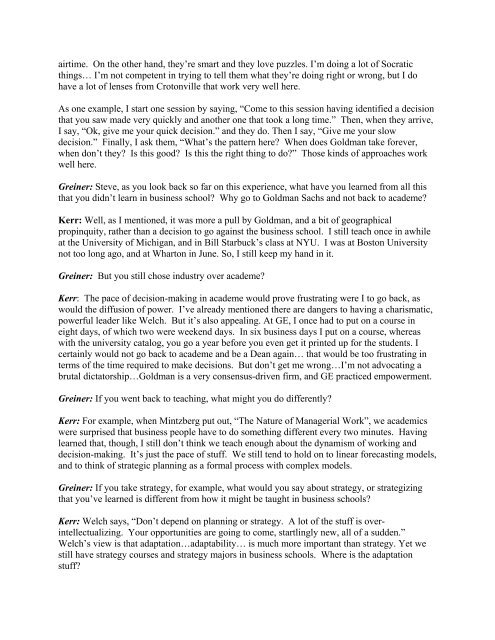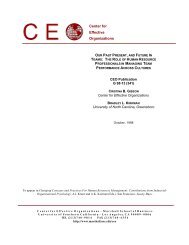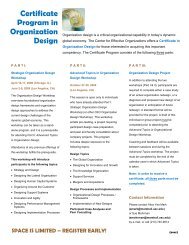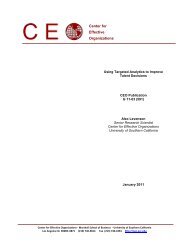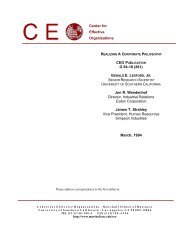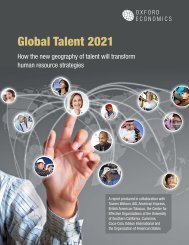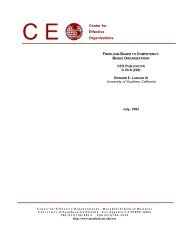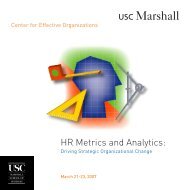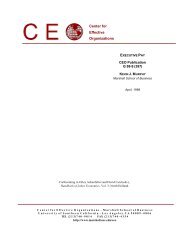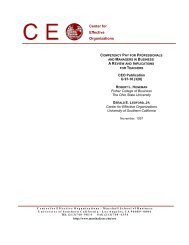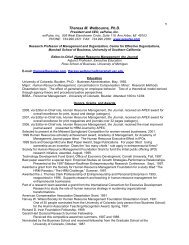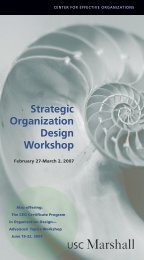Center for Effective Organizations - University of Southern California
Center for Effective Organizations - University of Southern California
Center for Effective Organizations - University of Southern California
You also want an ePaper? Increase the reach of your titles
YUMPU automatically turns print PDFs into web optimized ePapers that Google loves.
airtime. On the other hand, they’re smart and they love puzzles. I’m doing a lot <strong>of</strong> Socraticthings… I’m not competent in trying to tell them what they’re doing right or wrong, but I dohave a lot <strong>of</strong> lenses from Crotonville that work very well here.As one example, I start one session by saying, “Come to this session having identified a decisionthat you saw made very quickly and another one that took a long time.” Then, when they arrive,I say, “Ok, give me your quick decision.” and they do. Then I say, “Give me your slowdecision.” Finally, I ask them, “What’s the pattern here? When does Goldman take <strong>for</strong>ever,when don’t they? Is this good? Is this the right thing to do?” Those kinds <strong>of</strong> approaches workwell here.Greiner: Steve, as you look back so far on this experience, what have you learned from all thisthat you didn’t learn in business school? Why go to Goldman Sachs and not back to academe?Kerr: Well, as I mentioned, it was more a pull by Goldman, and a bit <strong>of</strong> geographicalpropinquity, rather than a decision to go against the business school. I still teach once in awhileat the <strong>University</strong> <strong>of</strong> Michigan, and in Bill Starbuck’s class at NYU. I was at Boston <strong>University</strong>not too long ago, and at Wharton in June. So, I still keep my hand in it.Greiner: But you still chose industry over academe?Kerr: The pace <strong>of</strong> decision-making in academe would prove frustrating were I to go back, aswould the diffusion <strong>of</strong> power. I’ve already mentioned there are dangers to having a charismatic,powerful leader like Welch. But it’s also appealing. At GE, I once had to put on a course ineight days, <strong>of</strong> which two were weekend days. In six business days I put on a course, whereaswith the university catalog, you go a year be<strong>for</strong>e you even get it printed up <strong>for</strong> the students. Icertainly would not go back to academe and be a Dean again… that would be too frustrating interms <strong>of</strong> the time required to make decisions. But don’t get me wrong…I’m not advocating abrutal dictatorship…Goldman is a very consensus-driven firm, and GE practiced empowerment.Greiner: If you went back to teaching, what might you do differently?Kerr: For example, when Mintzberg put out, “The Nature <strong>of</strong> Managerial Work”, we academicswere surprised that business people have to do something different every two minutes. Havinglearned that, though, I still don’t think we teach enough about the dynamism <strong>of</strong> working anddecision-making. It’s just the pace <strong>of</strong> stuff. We still tend to hold on to linear <strong>for</strong>ecasting models,and to think <strong>of</strong> strategic planning as a <strong>for</strong>mal process with complex models.Greiner: If you take strategy, <strong>for</strong> example, what would you say about strategy, or strategizingthat you’ve learned is different from how it might be taught in business schools?Kerr: Welch says, “Don’t depend on planning or strategy. A lot <strong>of</strong> the stuff is overintellectualizing.Your opportunities are going to come, startlingly new, all <strong>of</strong> a sudden.”Welch’s view is that adaptation…adaptability… is much more important than strategy. Yet westill have strategy courses and strategy majors in business schools. Where is the adaptationstuff?


